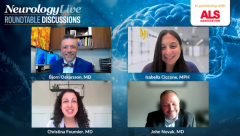
Highlighting the Collaborative and Inclusive Spirit of the ALS Nexus Conference
Clinicians reflected on the unique, patient-centered format of the ALS Nexus conference and its potential role in accelerating ALS research and promoting care collaboration. [WATCH TIME: 4 minutes]
WATCH TIME: 4 minutes
Episodes in this series

Recent advancements in amyotrophic lateral sclerosis (ALS) research may reshape how clinicians understand and help patients manage the disease, with potential therapies slowly emerging that aim to target both genetic and cellular pathways. Alongside these strides, there seems to be a growing emphasis on a holistic care approach following diagnosis to offer additional support for patients throughout the disease course. Furthermore, genetic testing could become more valuable in guiding diagnosis and offering refined treatment decisions for patients. Together, these developments in the field might highlight a shift toward more comprehensive, individualized care strategies that can address both the biological and lived experience of patients with ALS.
In collaboration with
In this third episode, experts discussed the ALS Nexus conference, held August 11-14, emphasizing the event's distinctively collaborative and inclusive approach for the ALS community. Unlike traditional research-focused conferences, clinicians noted that the ALS Nexus attempts to bring together patients, caregivers, researchers, and industry leaders to foster dialogue and innovation in the field. The panelists highlighted how this multidisciplinary format of the conference aims to promote dynamic interactions, encourage patient-driven urgency, and support the shared goal of accelerating the development of effective ALS treatments.
Transcript edited for clarity.
Isabella Ciccone, MPH: In terms of awareness, one of the biggest things that organizations put together are events or medical conferences and one of those being a new conference, which is the ALS Nexus. There was one held last year. For our audience, could you talk a little bit about your experience with the conference that was held last year, and then talk a little bit more about this upcoming year's meeting?
John Novak, MD: I was there last year, so that was the first year, and I was part of a panel there. But I think more importantly, it was a rather unique approach to a conference. It was talking about research, talking about some of the science, but also more about care and including patients and caregivers more than I think I’ve seen at other conferences. We go to these really scientific ones, and we get really nerdy, and we talk about these things. I think those are great but I think this one was a little bit, maybe, more welcoming to the patient side and the patient community, which I thought was great. I thought it was a very broad audience, which really makes a difference in between talks. The talks were great, but when you’re sitting at a table and the person next to you might not just be another researcher that you would have known anyway—it’s someone who’s living with or caring for someone, or has a different role in this ALS community. Good things happen when those people get together? I really think that cool collaborative projects come out of stuff like that. I thought it was a really good conference from that standpoint—that it’s just a very different conference.
Bjorn Oskarsson, MD: I’m attending there this year, talking about some trials that we’re doing in patients who don’t have a clear genetic target. And again, this does seem to be the thing that makes the ALS Nexus a bit different—that you’re mixing in patients, clinicians, scientists, and pharmaceutical industry all together in one conference. And it sounds very dynamic, and I’m excited about going.
Christina Fournier, MD: I think one thing that’s so great about the ALS field is how collaborative it is. I think that we recognize that we need all hands on deck to come up with treatments for ALS—and to do it quickly because of the timeline that people with ALS are living on. And so, it really is encouraging, at these types of conferences, to see all hands on deck, working together for what’s best for science and for people with ALS. I think that’s something that’s unique to the ALS community, it’s cool to see.
Bjorn Oskarsson, MD: That sense of urgency that, again, patients living with ALS convey. I mean, we still want to proceed faster with our scientific discovery, developing products that relate back to patients. And it is a slow. It is frustrating how slow all these processes that we engage in are. And even if we make progress, and get substantive progress, it is still slower than we wish it to be. I mean, we are really trying to be faster. And there are newer ways, new tools to measure ALS, that will make it easier for us to pick up on changes—smaller changes—so we can get to answers quicker, that Dr. Fournier had developed. There are many different things that we’re working on to speed the process. But we are all very, very aware of how frustratingly slow the progress that we are making is.
Newsletter
Keep your finger on the pulse of neurology—subscribe to NeurologyLive for expert interviews, new data, and breakthrough treatment updates.











